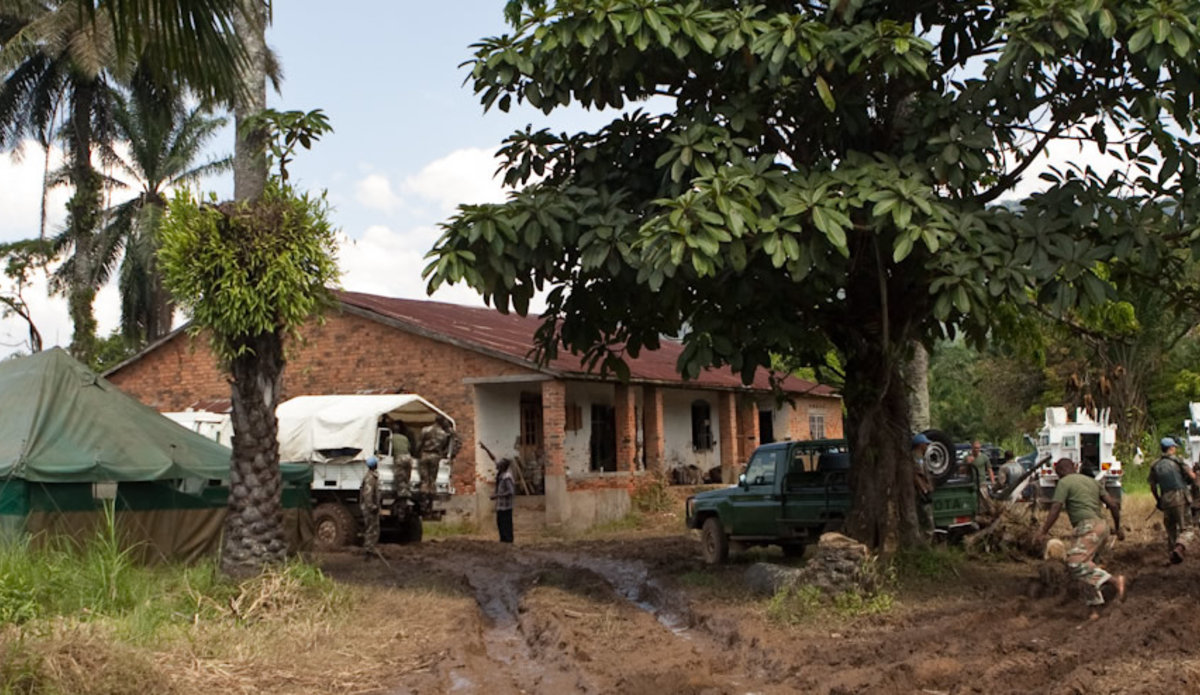Mandate
The Security Council extended MONUSCO’s mandate until 31 March 2014[1], with specific focus on:
- Protection of civilians, neutralizing armed groups, monitoring the arms embargo and support to justice, in particular through supporting the Force Intervention Brigade (FIB);
- Using the good offices of the Special Representative of the Secretary General to advance Sector Security Reform, including the creation of a Rapid Reaction Force, promoting an inclusive political dialogue for reconciliation and recovery, and the management of natural resources;
- Determining the division of labor between MONUSCO and the United Nations Country Team and handover of tasks to the fullest extent possible;
- Supporting the Special Envoy of the Secretary General assigned to lead the implementation of the Peace, Security and Cooperation Framework or “Framework of Hope” for the Democratic Republic of the Congo and Great Lakes Region signed by 11 Head of States in Addis Ababa on 24 February 2013).
Strategy
Civil Affairs will play a key role in the protection of civilians, civil-military cooperation, managing expectations and inter/intra confidence-building between all key players, and supporting the gradual transition from relief to recovery. In particular, Civil Affairs will consolidate and continue to develop the innovative approaches already initiated for the Protection of Civilians and Restoration (and Extension) of State Authority and focus on support to the Force Intervention Brigade to neutralize armed groups in the east.
Approach
Civil Affairs will focus on two themes in the development continuum, including:
1. Protection of Civilians (PoC)
Activities include developing the pilot tools, in particular the Community Liaison Assistants (CLA) and early warning, Joint Protection Team (JPT) missions, the Must Should Could (PoC) Matrix, and supporting the coordination system responsible for the United Nations system-wide PoC strategy and the development and implementation of (local) protection plans.
2. Restoration (and Extension) of State Authority (RAS)
Activities include focusing on the national dialogue for RAS, and building capacity with local authorities and civil society to create a protective environment so that livelihoods can be rebuilt, including facilitation of transparent, de-centralized governance processes for establishing a functional administration; supporting the establishment of conflict-management mechanisms to encourage community reconciliation; and planning stabilization and peace consolidation activities.
Partnerships
The Civil Affairs strategy involves establishing, wherever possible, strategic partnerships with (local) authorities, UNCT and Humanitarians, civil society and donors, as well as working with implementing partners in the field to increase effectiveness and efficiency through the interaction of similar activities to produce a greater result than the sum of the individual efforts (synergies) and obtain a catalytic effect to ensure sustainability.
Civil Affairs supports the United Nations Integrated Office, including United Nations agencies and OCHA, throughout the country to facilitate reconstruction, in particular in stabilization and peace consolidation, which is fundamental for MONUSCO’s exit strategy.
Methodology
In carrying out these activities, Civil Affairs will apply a Conflict Sensitive Approach (CSP) including[2][2] :
1) Context analysis of the areas of operation.
2) Identification of the key actors and their objectives.
3) Identification and facilitation of activities.
4) Analysis of the impact of the proposed activities (including Do No Harm), involving Government, civil society and beneficiaries.
Moreover, to facilitate the gradual handover of tasks to other development partners, Civil Affairs will take a project management approach towards its activities for:
- Management of Community Liaison Assistants (CLAs) and formulation of Community PoC Plans (CPP);
- Polling perceptions of populations on PoC and RSA;
- Development of a public administration guide and its implementation in the territories;
- Risk assessment mapping for planning recovery activities;
- Establishment and support of a Civil Society structural representation.
Quick Impact Projects (QIPs) and Outreach
Civil Affairs represents MONUSCO in confidence building meetings with the (local) Government, civil society and the population as well as other opportunities for advocacy, targeted messages and promoting public discussion on behalf of all sections on key issues and policies related to the Mission’s modern and innovative mandate. Civil Affairs will continue to apply the QIPs programme, as and when required. Outreach funds will be used for capacity building and support to the Government and Civil Society.
Logistics Support
The few roads and unsafe commercial airlines in DRC are unable to cope with the huge demand for transport. Hence, Civil Affairs continues to provide logistical support for programme implementation to UNCT members and CSOs and government officials involved in RSA. Civil Affairs ensures that all non-MONUSCO travellers meet the established registration requirements.
Monitoring and Evaluation (M&E)
Civil Affairs will enhance systematic M&E mechanisms to assess the effectiveness of its activities, inter alia, through quarterly performance reports (QPR) and regular polling of perceptions of the population in hot spots on PoC and RAS to identify the gaps which still need to be addressed. Moreover, Civil Affairs will continue to support JMAC in carrying out MONUSCO/GoDRC Joint Assessment Missions (JAM) to take stock of the progress made in achieving the mandate’s objectives and to determine future mission reconfigurations.
 UN
UN United Nations Peacekeeping
United Nations Peacekeeping
